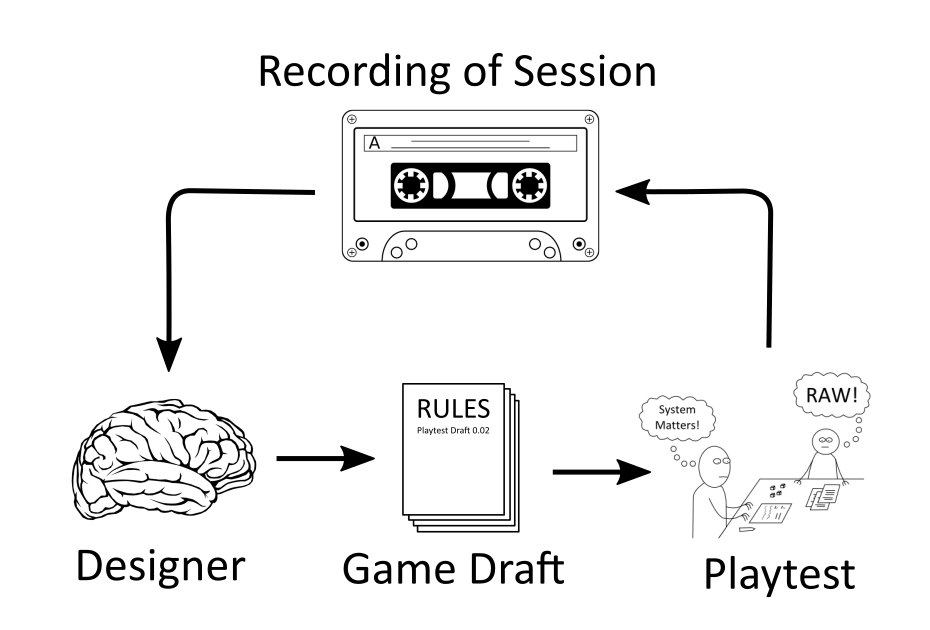When designing a tabletop RPG, the most useful feedback a designer can get is a recording of a game session based off of a draft of the current rules.

Record the session
While it's nice to be able to get subjective impressions or pick people's brains after the fact, there's a lot of information that you can get from a game session via a recording. There are a few reasons for that.
You miss a lot during a game session
Even in a non-playtest session of gaming you miss a lot. Games are designed to occupy a lot of your mind, so there are some things you just don't notice. Maybe somebody says something quietly and you just don't hear it. Maybe you were doing math or some other high-cognitive-load task that's part of the game and you didn't pick up on what someone else said. Maybe multiple people were talking at once and you didn't notice. Maybe you were busy thinking of what you were going to say and didn't give total attention to everyone else. Maybe you had one really frustrating moment in the game and that crowded out the more frequent but smaller good elements. Maybe you had one awesome moment during the game and that makes you forget the more frequent but smaller frustrations. Human perception and human memory don't capture everything, even if it feels like they do.
Playtesters don't know what they don't know
Playtesters generally do their best to play a game as they understand it. But a lot of what you're trying to test with a playtest is how well playtesters have absorbed and understand the system. If they misunderstand how they're supposed to do something their sense of what and where the problems are may be different from someone with a view of how things are supposed to work – their assessment that “the dice mechanic was too fiddly” may be built on top of them trying to apply the mechanic to a situation where it wasn't supposed to apply, or misreading how some other subsystem feeds into it, etc. (That's not to apply blame to playtesters for playing incorrectly – if blame needs to be assigned, which it doesn't, it's to the rules they were playing from for not explaining themselves effectively).
Audio is usually good enough
For most RPGs, most of the important information gets verbalized during play, so most of the important information will get captured by an audio recording. If you have a substantial non-verbal component, such as grid-and-minis combat, you may need something more extensive.
Listen to sessions that you were in
This might seem like a practice that you'd only care about for external playtests, not sessions you run yourself, but there's a lot you can learn from listening to your own sessions. If you're a human then the points above apply to you, too: you're not omniscient, your memory emphasizes some things and de-emphasizes others, and your sense of a game when you actually play it may be different than the model of it that you have in your mind. I used to produce an actual play podcast of my playtest sessions and I always noticed things by listening to the recordings that were different from my in-person recollections. It's possible that I'm some weird outlier there, but I think most people would have a similar experience.
Be prepared for the “I hate the sound of my own voice” effect
Your voice sounds different inside your own head than it does out in the world. If you're not used to listening to recordings of yourself this unfamiliarity can make listening to recordings of yourself seem unpleasant. You can get used to that. (I can't promise that your voice sounds good, but it probably sounds better than your first impression).
It's probably good to listen to other actual play sessions so you have a baseline
I used to listen to a lot of Actual Play podcasts. I've dropped off of that practice over the past few years, but I think listening to a variety of different people playing a variety of different games helped give me a context for understanding RPG session recordings, what it sounds like when people are having fun, what it sounds like when they're confused or uncertain, etc. I would recommend going for podcasts where the focus of the players was on playing the game rather than people who are intentionally trying to “put on a show” for their podcast audience. You want to get a sense of what gameplay sounds like, not what performance or showmanship sound like.
You can ask other questions, too
Asking people what they thought of the rules when they read them, whether they they had fun in the session they played, what their favorite or least favorite parts were, etc., can be useful information in addition to a recording. But if you had to choose, I'd recommend a recording of a playtest over any other form of feedback about a game. Obviously this is also one of the most high-effort forms of feedback, so it's rare when you can actually get it.
Downvoting a post can decrease pending rewards and make it less visible. Common reasons:
Submit
We're hoping to have audio recordings of all our playtests that we use for internal reference and also as a Patreon tier (in case people are interested).
It's surprising how quick things go when you're listening to the game a second time. I remember getting a hour-and-a-half into a game of Only War, which I typically consider dreadfully slow, and realizing how much stuff happened.
Downvoting a post can decrease pending rewards and make it less visible. Common reasons:
Submit
thats great, RPG and many games need lots of playtesting, to make rules dynamic and fun, very good guideliness you rock! cheers from @calabozocriollo Venezuela.
Downvoting a post can decrease pending rewards and make it less visible. Common reasons:
Submit